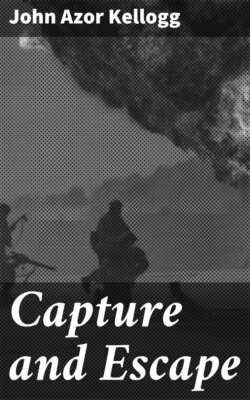Читать книгу Capture and Escape - John Azor Kellogg - Страница 7
На сайте Литреса книга снята с продажи.
The Iron Brigade in Camp
ОглавлениеTable of Contents
On the morning of the third of May, 1864, the Army of the Potomac confronted the Confederates on the banks of the Rapidan.
The consolidated First and Fifth Army Corps was commanded by Major-General George G. Warren.[1] To this corps was attached that part of the Army of the Potomac known as the Iron Brigade, then under the command of General Lysander Cutler, one of the ablest of our volunteer generals. To this brigade was attached the Sixth Wisconsin, commanded by Colonel (afterwards General) Edward S. Bragg. I commanded Company I in this regiment.[2]
Fearing a repetition of the long, cold winter of 1863–64, the army, under the immediate supervision of that thorough soldier, General George G. Meade, had been re-organized, completely equipped, and fitted for the stern duties of the next campaign.
The hills around Culpeper were dotted with the white tents and rude yet more comfortable cabins of the patriot soldiers. All along the banks of the Rapidan, at regular intervals, curled the smoke of the picket fires. Beyond them trod the weary sentinels, whose watchful eyes and stalwart arms had for twenty-four hours guarded their comrades in camp from surprise and consequent disaster. But now the allotted time for relief had come, and they stole an occasional impatient glance toward the long blue column winding its way along the turnpike toward the reserve post, knowing that it was the relief guard that was to take their place in the tedious, irksome, and sometimes dangerous outpost duty.
In camp, here and there, might have been seen a regiment executing the beautiful evolutions of battalion drill, and perhaps a camp guard being mounted, the air meanwhile resounding with the martial music so inspiring to the soldier. To the civilian all would have seemed confusion; but to the soldier the scene simply represented an army at rest; his eye could only see the monotonous details of camp life, the every-day life of the soldier. Such had been the daily routine through weary months of waiting, until all were eagerly anticipating the order to move.
As the sun disappeared that night, behind the western hills, its last beams shone upon an army whose banners floated from every hillside and valley as far as the eye could reach; and as the camp fires came out in the deepening twilight, they glimmered and sparkled like the lights of some great city.
The camp guards paced their well-trodden beats. The confused murmur of thousands of voices mingled together, conversing of home and friends; occasionally a merry laugh would arise, as some wag related a droll story, or, more frequently, perpetrated a practical joke upon a comrade, until "taps" sounded, and the lights went out as if by magic. Gradually all sounds died away, and the army was at rest. Dreams of wife, children, and home blessed the sleeping hours of the patient, waiting soldier, cheating him into a few minutes of bliss.
